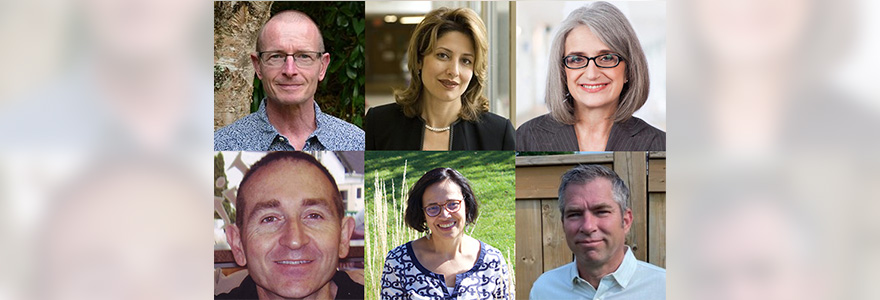
(Clockwise from the top left) Professor Frank Boers, Professor Farahnaz Faez, Professor and Dean Donna Kotsopoulos, Professor Wayne Martino, Professor Veronica Pacini-Ketchabaw and Associate Professor Paul Tarc.

(Clockwise from the top left) Professor Frank Boers, Professor Farahnaz Faez, Professor and Dean Donna Kotsopoulos, Professor Wayne Martino, Professor Veronica Pacini-Ketchabaw and Associate Professor Paul Tarc.
Six new projects led by researchers at the Faculty of Education at Western University have received Government of Canada support thanks to the important findings they’re set to bring.
The federal funding stems from the 2022 competition for the Social Sciences and Humanities Research Council’s (SSHRC) Insight Grants, the results of which were published in August. Intended to support research excellence in the social sciences and humanities, Insight Grant-funded projects share a common goal of addressing complex issues about individuals and societies, while furthering Canada’s collective understanding.
Research proposals face intense scrutiny during the competition and faculties can expect about 50 per cent of their applicants will be approved for funding.
The Faculty of Education bucked the trend and instead saw 75 per cent of its applications approved. It also received the most Insight Grants out of all faculties across Western’s campus.
“This might be our most successful Insight Grant competition to date,” said Nicole Neil, Associate Dean of Research.
“I am so excited to see the high-quality impactful work our researchers do be recognized with funding to support it.”
The results are also a testament to the support provided by the Faculty of Education’s research office, a team that Neil says she’s deeply proud of.
“All our research office team started last year, so to have this success is just a wonderful motivator for us.”
Neil hopes the results serve as a motivator for other Education researchers considering an application to one of SSHRC’s several grant competitions.
“You won’t see success if you don’t try for it. I believe that all our faculty members do research that is important and has the potential to make impacts that benefit society,” Neil said.
“Even if they don't receive the grant, the process of applying can be a valuable learning experience that can help them grow and develop as a researcher and refine a proposal for a future competition. A large portion of our grant submissions were second and even third attempts.”
Education Dean Donna Kotsopoulos considers this year’s Insight Grant results to be a tremendous success for the entire faculty. Kotsopoulos herself is one of six awardees.
“I’ve worked hard to maintain my research program since becoming dean. It was important for me to continue to demonstrate excellence in and a commitment to research and/or teaching. Leading by example has been my goal,” Kotsopoulos added.
Below is a list of all six awardees from the Faculty of Education.
Lead researcher: Frank Boers, PhD.
Funding amount: $114,032
About the project: There are many language courses with different types of exercises that seem questionable from the perspective of cognitive psychology, especially given prior research about how memory works.
This project evaluates the merits of such exercises by examining the learning outcomes and by relating the outcomes to the way people individually engaged with the exercises. To investigate the latter, the research team will resort to think-aloud, stimulated recall and eye-tracking procedures.
Lead researcher: Farahnaz Faez, PhD.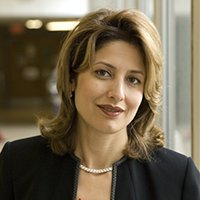
Funding amount: $99,976
About the project: This is a mixed-methods study designed to understand teacher learning and efficacy for teaching in linguistically and culturally diverse classrooms.
The project will centre around the development of a unique survey that measures teacher efficacy for Canada’s multilingual classrooms. This will be the first survey tool of its kind and researchers hope their findings can be transferred to a myriad of other studies.
Researchers will evaluate the upcoming survey by gathering data from participants in three faculties of education in Ontario, as well as from teachers of varying experience levels. The study will generate knowledge on how self-efficacy for teaching in multilingual contexts changes through initial teacher education programs. Researchers will also identify factors that impact the development of self-efficacy for teaching in multilingual schools.
The project’s findings can be used to promote quality pedagogy in Canada’s diverse schools that is both culturally and linguistically inclusive. The findings will also prove useful for educators, teacher education programs and policymakers committed to equitable teaching practices for all students.
Lead researcher: Donna Kotsopoulos, PhD.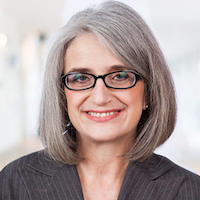
Funding amount: $220,006
About the project: This project will explore key levers of organizational change in higher education.
Inspired by the history of Laurentian University, an interdisciplinary team will be examining the context at other institutions across Canada to determine how organizational change occurs and can shape teaching and research.
Lead researcher: Wayne Martino, PhD.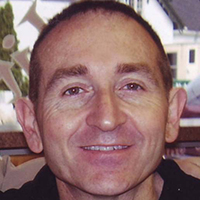
Funding amount: $224,381
About the project: To what extent is far-right extremism and its weaponization of transphobia impacting educators and affecting support for trans inclusion and trans affirmative education in schools? This is a central question of this project, which will survey educators in Alberta, Ontario and Saskatchewan, as well as those in the state of Arizona.
Martino says addressing this question is crucial to understanding the conditions that help to explain the failure to secure the human rights and well-being of trans students in schools. This failure has arrived despite an explicit legislative commitment to supporting gender diversity in Canada. The failure is also present given the rise of Trumpism and post-truth politics in the United States, which has spurred anti-trans legislation in jurisdictions such as the state of Arizona.
Lead researcher: Veronica Pacini-Ketchabaw, PhD.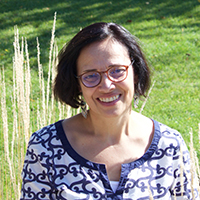
Funding amount: $343,252
About the project: Early Childhood Educators for Ecological Justice (ECEforEJ) responds to two SSHRC future global challenges: Living within the Earth’s Carrying Capacity and The Pervasive Contamination of the ‘Natural.’ The project brings together early childhood educators, pedagogists supporting these educators in their daily practice and early childhood scholars with a background in environmental education.
ECEforEJ’s findings will help transform our ecological futures through the contributions of early childhood educators and the project has the potential to shift early childhood education curriculum across North America, South America and beyond. With plenty of insights to be gathered for diverse international audiences, ECEforEJ could establish Canada as a leader in dismantling ecological injustices.
Lead researcher: Paul Tarc, PhD.
Funding amount: $98,240
About the project: This project aims to translate and mobilize UNESCO’s 2021 report, “Reimagining our futures together: A new social contract for education,” which issues an essential call for re-imagining education, teacher education and the work of teachers.
Demands have intensified for education to be relevant in our present moment of heightened global inter-dependencies, inequality, violent conflict, social hatred and ecological precarity. This is coupled with the aspiration that education is key to making a better world. With these hopes and demands, come theories and ideas on how education should be modelled, as well as how teachers should carry out this work. Without a substantive understanding of what teachers are doing and the complex pedagogical conditions in which they teach, these proposals risk inconsequential impacts.
In this four-year qualitative study, researchers will observe teachers working in secondary schools in Canada during site visits. The team will also conduct multiple semi-structured and open-ended interviews with participating teachers before, during and after the site visits.
These findings will fuel the creation of case profiles of each teacher's practices for worldly and critical pedagogies, so that they can be used by educators, researchers and the wider public.